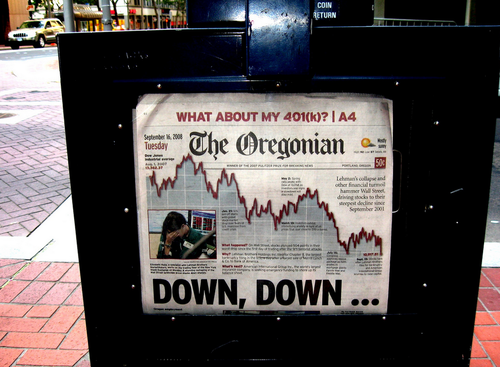by Ben Carlson, A Wealth of Common Sense
This was the headline and first few sentences from an AP story last weekend:
Time to Ditch Rising Stocks, or Stick With Them?
Is it time to cash out of stocks?
The market has nearly tripled in a little over five years, and the Standard & Poor’s 500 index closed above 2,000 for the first time on Tuesday. With each record, the temptation grows to take your winnings and flee.
Plenty of experts think stocks are about to drop. But many others offer compelling arguments for the rally to continue for years.
Change the level of the index and this same story could have been written in 2012. But the point here isn’t the level of the stock market or the cumulative gain since the bottom.
If you’re asking yourself this question on a consistent basis, and I know many investors do because I get this question all the time, then it’s a sure way to know that you don’t have a plan in place.
It’s an admission that you’re guessing what the market will do over the short-term, which no one can do, instead of using a process to guide your actions. This is the case no matter what kind of investment strategy you employ.
One of the biggest reasons for the persistent behavior gap in average investor performance is a waffling from strategy to strategy depending on the most recent environment. Right now everyone assumes they’re a long-term investor because markets are going up. After the crisis everyone wanted to be a tactical investor.
It’s tempting to become a bandwagon market-timer, but trying to go all-in or all-out can leave you in no-man’s land without an exit strategy. Even if it works out on occasion, basing success on these types of outcomes is only courting future disaster. Eventually your luck will run out.
James Montier covered this in The Little Book of Behavioral Investing:
"People often judge a past decision by its ultimate outcome rather than basing it on the quality of the decision at the time it was made, given what was known at that time. This is outcome bias. We must concentrate on process. Process is a set of rules that govern how we go about investing. When every decision is measured on outcomes, investors are likely to avoid uncertainty, chase noise, and herd with the consensus. Sounds like a pretty good description of the investment industry to me."
I heard a great quote this week that said you should plan on being frequently wrong but never confused with a good investment process. This doesn’t mean it’s not nerve-racking to stick with a plan when the market pendulum swings too far in either direction. But the direction of the markets is out of our hands anyways. We have no control over where they’re going to go.
Let’s say you started out 2012 with a 70/30 portfolio of stocks and bonds and you let your allocation drift with the markets. You would now be at roughly 80% stocks and 20% bonds.
If your investment plan says you should rebalance to get back within your stated risk parameters it would be tempting to roll the dice and hope stocks continue their climb higher. Putting off the rebalance probably sounds like a great idea because it’s worked so far. And maybe stocks continue to charge higher and it still works for a while.
Yet even if they do, what’s the point of setting an asset allocation rebalancing policy in place if you’re not going to follow it? Diversification is one of the best risk controls you can place on a portfolio, but it’s fairly worthless if you don’t rebalance to take advantage of the differences in asset class performance.
Obviously, you could place a strategic portfolio tilt for or against stocks, but if you’re saving for retirement, then invest for retirement. You don’t have to be all-in or all-out. You don’t run a hedge fund. You’re not a mutual fund portfolio manager. You don’t know the future.
Not only is going all-in or all-out nearly impossible to pull off strategically, but it’s also exhausting from a psychological standpoint. Once you make either move there’s a natural tendency to second guess that decision based on every minor tick in the market that goes for or against your position. Eventually the stress wears you down to the point that you either capitulate or completely freeze and never get back in.
There’s no point in instituting a plan if you’re not going to follow it. With a consistent process, the portfolio moves that feel the worst are likely the best ones for you over the long run.
This post from Ben Carlson (@awealthofcs) originally appeared on A Wealth of Common Sense.
Photo: Todd Mecklem
Copyright © A Wealth of Common Sense













